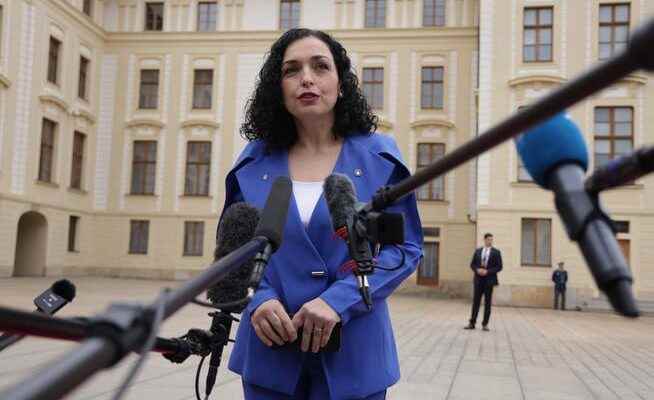Kosovar President Vjosa Osmani has to announce the postponement of local elections.
(dpa)/vof. Local elections, originally scheduled for December 18-25 in northern Kosovo, are being postponed to April because of growing ethnic tensions. This was announced by President Vjosa Osmani on Saturday after consultations with the political parties in Pristina. The exact date will be communicated later.
The elections became necessary because the Serbian mayors and municipal representatives in four municipalities in northern Kosovo had resigned. In doing so, they had protested against the now suspended license plate regulation of the government in Pristina. Several Western diplomats had previously called for these elections to be postponed.
Apparently angry ethnic Serbs also blocked country roads in northern Kosovo. They were reacting to the arrest of an ethnic Serb, until recently a Kosovan police officer, who is said to be responsible for attacks on planned polling stations. “Extremist groups” had set up barricades in the towns of Leposavic, Zvecan and Zubin Potok, Interior Minister Xhlelal Zvecla wrote on Facebook. Because of the barricades, the northern border crossing at Jarinje was closed, the police said.
When the election was postponed, Osmani also referred to analyzes by the police and the secret services of the danger situation. On the night of Friday, Serbian militants shot at a Kosovan police patrol in the municipality of Zvecan. A police officer suffered minor injuries and the officer’s vehicle was severely damaged.
On Tuesday, militant Serbs also fired shots in the air at election workers and police officers who wanted to prepare for the elections. As a result, Kosovo’s police reinforced their forces in the northern part of the divided city of Mitrovica. 300 additional police officers took up positions in the districts inhabited by Albanians and Bosniaks in the otherwise mostly Serb half of the city.
To this day, Serbia is not ready to recognize Kosovo’s statehood, which has existed since 2008. The small Balkan country is now almost exclusively inhabited by Albanians. In the enclave of North Mitrovica, which borders directly with Serbia, Belgrade operates its own power structures, which are based on militant activists and criminals. These repeatedly erect roadblocks and initiate violent incidents.
